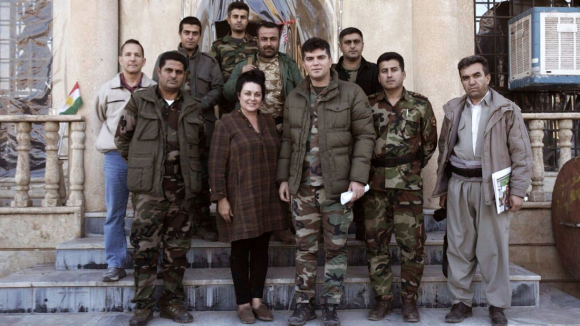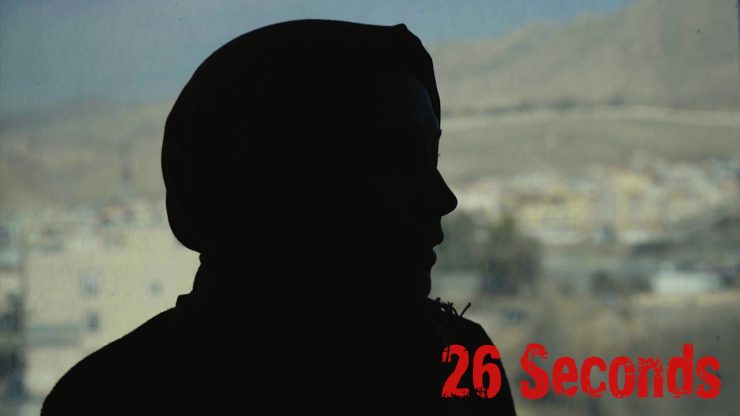The most difficult part of filming a documentary about sex trafficking is seeing the trauma manifested in each victim.
Fear or emptiness behind the eyes. Constant unease in the voice.
It’s an experience that Dodge College Professor Kelly Galindo confronted too many times while filming “26 Seconds,” which delves into the details of sex trafficking by the terrorist group, Islamic State in Iraq and Syria (ISIS).
“I interviewed a woman who couldn’t stop rocking back and forth,” Galindo said. “She had lost 12 children to ISIS. She was very much not healed or restored.”
Galindo is aiming to spread awareness about human trafficking and motivate viewers to take action. The creation of the film, which was released on EpochTV on Nov. 24, has been a yearslong journey for Galindo.
“When I started, not much was being talked about with human trafficking,” Galindo said. “Now, there is a national dialogue about this issue. I am pleased that awareness has been created and that I could contribute to the discussion. I hope that people are stirred to step forward and do something.”

Advocating for Victims
The film is deeply personal for Galindo, who has been working on it since 2016. Her passion to be an advocate for victims was kindled about five years earlier when she saw a “Dateline” episode depicting trafficking in Thailand.
“I was mortified and sick to my stomach,” Galindo said. “I knew that awareness had to be created.”
Galindo contacted Destiny Rescue, an international nonprofit that fights the trafficking of children with prevention, rescue restoration and reintegration programs. About six months later, she traveled with the organization’s rescue agents and filmed the victims who were being rescued by the nonprofit in Thailand. This footage was made into an award-winning short film that was distributed on Google Play, Amazon Prime and iTunes.
Read more:
Exploring Peace Studies Through Documentary Film with Nobel Laureate Nadia Murad
The project grew from there. While balancing teaching at Chapman, Galindo filmed in Iraq, Cambodia, India, Uganda, Tanzania, Kenya, Mexico and the US. She wrapped up filming in East Africa in 2018.
Galindo initially planned on including all of the countries in her film, but decided to focus on Iraq after reviewing the footage and determining that it could serve as a feature on its own. Galindo found the trafficking in Iraq to be unique from the rest of the world because the exploited girls were raped and abused by ISIS soldiers.
“It’s not like other countries with red light districts or massage parlors,” she said.
Future Projects
To draw attention to the other countries where she filmed, Galindo started a YouTube channel highlighting nonprofits that support trafficking victims. It also features panel discussions Galindo held at Dodge College.
Currently, Galindo is working on partnering with a network to create a docuseries that focuses on human trafficking in the US. The series will highlight Bakersfield, Los Angeles, San Diego, Orange County and Las Vegas.
For the docuseries, Galindo will seek help from Dodge College students and alums who worked on “26 seconds.” Her cinematographer, colorist, assistant editors, production assistants and post-production assistants all had ties to the college.
“Without their talent and support, the project wouldn’t have gotten across the finish line,” she said. “Filmmakers have a responsibility to film things that matter in our world. I think that’s one of the things I’ve taught my students, to work on worthwhile projects and that we have a responsibility as filmmakers to make a difference. I hope that this inspires them for their own projects after they graduate and go out into the world.”

Hands-on Learning
It’s rare for students and recent graduates from around the country to have the chance to work on meaningful projects with important social messaging. While working on “26 Seconds,” the young filmmakers gained valuable experience and contributed to a film with a strong message.
Alex Iseri (MBA/MFA ’20) served as the colorist for the film, spending about three months on the project in early 2023. Iseri, who earned his MBA/MFA in film producing from Dodge College, volunteered for the film because he believes it’s important to maintain ties with Chapman.
Working on the documentary was beneficial for Iseri’s career. He learned valuable skills and editing techniques while being exposed to new filmmaking experiences. Iseri is an assistant editor at Electric Entertainment for the show, “Leverage: Redemption.”
One challenge Iseri confronted while editing “26 Seconds” was preserving peoples’ identities. Iseri had to ensure that victims’ faces were hidden and couldn’t be revealed even if somebody tried to lift images from the film. Iseri had never worked on a project where he had to protect subjects from negative repercussions.
“It was a big responsibility,” Iseri said. “It would be bad if somebody figured out who the survivors and rescue agents were and tried to hurt them.”
Read more:
Chapman alum crafts groundbreaking documentary about grief and loss
Nathan Slevcove ’24 also came onto the project in the latter stages as a finishing editor. He was able to get firsthand experience that he’ll carry with him into his first professional role.
Slevcove said the hands-on experiences that are available to Chapman film students are immensely important for learning and transitioning into a career.
“That couple months of working with alums and professionals and getting that knowledge from people who have been working in the industry was huge for me,” said Slevcove, who is majoring in film production with an editing emphasis.
Slevcove appreciated the opportunity to contribute to a film with a strong message. When he first agreed to work on the documentary, he didn’t realize how in-depth it delved into sex trafficking.
Considering the film was eye-opening for him, Slevcove is hoping the documentary will spread awareness about the impact of trafficking.
“I haven’t worked on anything this powerful before,” Slevcove said. “Human trafficking is so much more widespread than people think.”




